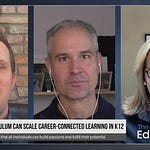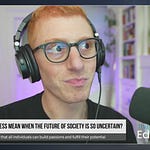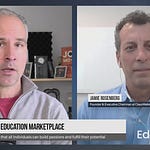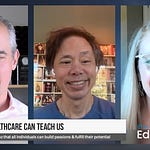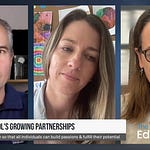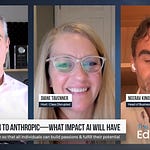Engaging alumni—whether to have them help current students or for fundraising—isn't easy for many colleges and universities. And it's arguably been getting harder (especially on the fundraising side) even as the alums of any college or university are often their most valuable asset. What's the benefit to the alums that their alma mater promises? What sorts of engagements are meaningful to them? In this conversation with Max Leisten, founder of Protopia, he talks about how his company uses artificial intelligence (AI) to answer this question. The company does it without creating an app for users—there are enough of those he told me, and he doesn't want to create more friction. And he does it by intentionally avoiding the use of the word "mentor" when he asks alums to support current students—because that's a word that implies a real commitment on the part of students and alums. More friction, in other words.
As he told me: “Sometimes I talk about this in Venn diagrams. You’ve got the alum that is looking for impact. The student that’s looking for you to deliver on that promise of life-long community. You’ve got that front line fundraiser that says I need more and better conversations with the right donors. And that sweet spot, that’s where we operate."
As always, you can listen to the conversation above, watch it below, or read the transcript as a paying subscriber.
Michael Horn:
Today we have Max Leisten, he's the founder and CEO of a company called Protopia. And they offer what they refer to on their website as personalized donor experiences at scale, empowered by artificial intelligence. There's a lot there I think that's very interesting. As someone who has been a fundraiser for my alma mater since I graduated, I'm particularly intrigued by this.
And Max first, thanks for joining us, but I'll give my personal vent up front because I think you helped solve it, which is it's always struck me that when you're fundraising, you have all these mass announcements historically going out to every member of the alumni body. And some people really love green energy and want to give to campus initiatives. Some people probably think it's the devil and don't want to. Other people really get excited about financial aid or research or whatever else. And yet we're broadcasting all these messages historically in a mass way. We're going to get into it in a moment, but my guess is that this is what you're tackling. But I want to just start with your own personal background before we get into what Protopia is. How did you come on this journey to founding this company to start to give these personalized donor experiences?
Leisten:
No, thanks Michael. And I'm extremely excited to be here. Thank you for hosting us and we probably should come up with a safe word once I start talking because I'm so passionate about all the things you just mentioned and particularly the journey that got us to where we are, the company today.
Yeah, so first of all, Max, founder and CEO of Protopia, and that accent is German. So before you were curious, it is German. I came over here a long time ago. My wife's from North Carolina and that's how we ended over here. And it was a little bit, I think like most founders a painful journey. And I advise as founders up to this days on when they should start a startup or not. And in most cases, to be honest, I say run while you can because these are tough journeys.
But I worked for a number of decades at SaaS startups, always in the enterprise side. And I worked for a high education enterprise software in a product management capability. Always love working with customers on the problems to solve. And we are just finished raising a Series D for my startup. And we were incredibly burned out. I was burned out, my soul was gone because it's really hard to work in a startup.
And so I quit my job and my wife has an impact job. And to be honest, Michael, I got actually really jealous that she managed to make a big difference. And I thought, well, why can't I do something that I feel better about versus more software? And I went on a big learning journey. My undergrad degree is in marketing, HR. I've always been curious about people's careers. And that was the last time I felt really good. And why am I doing this? Why did I start my journey on that career side? And I had a lot of lunches with people and I basically said, tell me a little bit where you're struggling with your career search.
And the second stage of the career search is the resume. So most people get feedback on their resume from friends and family. They know it's not good, but because it's not relevant and most cases, family will never tell you the truth. So we basically started by taking your resume, sharing it with people that are relevant to you. And I would say, give me feedback five minutes blind for Michael and I'm going to collate this and share it with Michael. And Michael felt great, right? You would say to me, oh my God, this was amazing. I can't believe they told me the truth.
Here's the thing that really sparked where we are. The people I asked to help to give you feedback on your resume called me back to, emailed me and said, where's my next resume? I want to help. This was amazing. I loved it. It was quick, it was blind. And I told my wife saying, I don't know I'm going to make money with this, but I feel like a million dollars, Mike. I feel like I make a difference in Michael's life and in the life of people that help others because behavioral science shows that helping someone actually feels better than getting help. It validates who you are. You feel amazing for a few minutes and you want to know that your community is there for you when you need help. So it validates a little bit all the things you've done in your past.
So we went on a road trip, looked at the data, and it turns out that one of the greatest affinities, why we help others is alma matter. We looked at women reentering the workforce, veterans, people living in the same city, but if we were to say, hey, here's a Carolina grad that needs help, not only would you recognize why you should help that person, but in a sense you also remember that amazing experience you had on campus. You're thinking back to a time where the world was still amazing. You had so many options and that combination had people engaged at a much higher rate than other affinities that you may have in common with someone.
So we went on a road show, I did a bunch of reading, and it turns out that institutions sit on that gold mine of goodwill because you are alma mater. You can't wait to help someone that's on the same journey that you're at. And these institutional leaders, when I talk to them, I said, wow, you're sitting on this gold mine of goodwill. How are you mining this? And they start complaining saying, well, we're trying to solve it. We're building platforms and we don't know why are alumni not coming back? They're not signing up. We want them to help students. And then we talk to students, why are you not signing up? Why you're not joining this mentoring program? When we talk to alumni, why you're not helping? What's in the way?
So from a design thinking perspective, we did a lot of exploration of what's in the way of something that comes so natural to us that we all desire give and get help from each other. And so we built a platform from there, but it was quite a journey to be honest. And for me the true north always was let's make it easier to help each other because it was totally selfish to be honest, Michael. It was what makes me feel good and what helps me make an impact and that guided that journey.
Horn:
It's awesome. And it's interesting listening to you because obviously your founding story then is very different from what's on the website right now. It sounds like you essentially built a tool that could help alumni connect to each other. And you're totally right, someone from my alma mater, I'm much more likely to help than someone from another random place because human beings, for better or worse, we like tribes. We have these affiliations. And so it seems like you're unlocking that progress and really helping people connect on their own career journeys. How does then Protopia move to this donor side of the equation? Is that sort of like the, okay, this is what we're doing for the alums, but we also have to do something for the institutions in the process or how does that kind of work?
Leisten:
No, and it is funny. And most startups, it took us a while to understand who the buyer is. So I can lead with an emotional story. I want Michael to help someone because I love seeing Michael happy that he gives back. The funny thing that took us a while to realize, there's a lot of established data that when an alum helps and volunteers, she is three and a half times more likely to donate money. It's a [inaudible 00:08:20] good institution saying you need to connect alumni and students. You feel good, but what's the actual benefit to the institution? And the benefit is that the alum, when she discovers, reconnects the institution, it is a lot easier to unlock and get her to donate. And one thing I firmly believe that nearly every alum would give money to the institution if you make it about them personalized and relevant and simple.
And it was a conversation with the advancement shop. I mean donations as I think about 30 to 32% of an institution's operating budget. So they are really dependent on donations, not, I'm not just talking about the capital gifts, I'm talking about the long tail giving and curating and building that donor base of that next generation.
And for us was, well, there's many reasons you can get that alum back to come to campus in particular with COVID, it's got to be digital, they're not going to travel back to campus and nothing works better than to get that alumni to volunteer. And for us it was how can you make that volunteering easy, that giving back where Michael would share something with another student and feels good. And then the person that really cares about this in a sense, as you can see on our website, is their frontline fundraiser, right? And really, sometimes I talk about this in Venn diagrams. You've got the alum that's looking for impact. You've got the student that's looking to for you to deliver on that promise of a lifelong community. And you've got that frontline fundraiser that says, I need more and better conversations with the right donors and that sweet spot, that's where we operate.
Horn:
It's super interesting. So then the business model in effect is you're going to the university, they're paying you some license fee, I'm assuming you're not getting a percent of donations and then, so it's a license fee. And then you're basically sitting in the middle of this and facilitating these different interactions, whether it's students to alums, whether it's alums to university, and basically allowing them to have a personalized moment to be able to give back in some way. Is that the way it works?
Leisten:
That is a hundred percent spot on. Couple of nuances, Michael. We often actually say that you've got to make your entire community to everybody. So one of customers is NC State University, and when you look at what they do, they invite prospective students to come back and ask current students, past students, faculty, researchers, entrepreneurs, parents. It really is making the entire community available at the push of a button. And then our job is to find the right people that can respond to something. And the nuances going back to a little bit who pays and the business model, yes, it's a license fee, it's based on how big the institution is, but also giving you ROI for this.
Horn:
Gotcha. So let me ask a question then, because there've been other companies, and I know we emailed about this beforehand, that have come into the space of trying to connect alums to students to help them with their career journeys. PeopleGrove, for example, comes to mind. Others, I don't know that they've jumped to the donor side of this equation, at least in my knowledge. But how is your approach different from some of these other players out there that have been trying to create the mentorship opportunities, so to speak?
Leisten:
Yeah. So let me start at the tail line. I actually intentionally avoid the word mentoring because that's actually one of the challenges. And I think the space seems to be moving away a little bit further. If you look at PeopleGrove, they're now really a career platform versus mentoring platform. 'Cause the problem with mentoring is that it's a really hard step. It's students often not looking for mentor, they're just looking for help. And alumni are not looking to become mentors because I don't know about you. It's a big commitment. So we often say we spark relationships.
Now how we're different. It really goes back to design thinking, asking students and alumni what's in the way of them connecting with each other. And number one is we're actually not a platform. There's some amazing platforms out there, the Graduway, the Almabase, the Hivebrite, the PeopleGrove, but the average professional uses 35 different apps in her day. They're not looking for app 36. It's really easy.
As you know, we're going to get to the I part, it's never been easier to build an app. I can go to ChatGPT, give it a command in Python saying build me an app that is great for alumni engagement with some event management and a forum and two, three years from now it will help that build in an hour. And then my challenge becomes on how to differentiate from everybody else out there. And you just have to go to G2 and how many alumni engagement platforms are out there. But the core challenges in a world where we're flooded with apps, another app was not the answer. And that's really not what we heard from alumni and students. So we're not an app.
The second problem that's closely related to this is that alumni told us they don't want to sign up for anything else. They don't want to sign up or sign in for anything else. They don't want to opt into anything else because to overwhelm. That does not distract from their capability and desire to give back to something. So we are really selling, we are an opt out platform. We typically get the institution's entire member data, constituent of data and that is what we use to then find and mine the best alumni that can help. An analogy I often use and how we're different is, and you may remember this. Fidelity, you actually had to sign up for 401K about 10 years ago and the industry basically said, why is it so hard for someone to get out, sign up for something when we know that's what they want? So they flip the model, everybody's now opted in your 401k and you have to opt out because it's in your interest to hear this to save money.
We've taken a save model, everybody's enrolled because it is hard to get somebody opted. I'll give this statistic. The typical alumni engagement software has about 7% at most of alumni sign up. That is not the fault of those platforms because they're really good Swiss army knives, but alumni will not sign up and about 2% of alumni come back on a regular basis. And we flipped this around. We said, okay, we know Michael wants to help. What's it going to take for him to help? Let's go to him. Let's use tools he's already using. Let's not force him to do something, a barrier that prevents engagement. But it really is, we're different. There's no platform, nothing to sign up for. We use tools that you already use, email, Slack, SMS. And our job is to tell you the right story about somebody essentially who wants to be you in about 20 years.
Horn:
In essence, you basically get access to all the data in a university's CRM, maybe their SIS, whatever systems that they are using to store that. And then I'm guessing this is where the artificial intelligence comes into play. It's starting to make pattern matching recommendations and so forth. And it says to a student, hey, or an alum or whomever, hey, we have a connection for you. Would you chat for 10 minutes with this person who's struggling with X? Or whatever it might be. Or maybe it seems like as you've gone down the donor way, like hey, you love Duke basketball. Coach K retirement, watch this great video or whatever it is based on the proclivities. And you're probably looking at past campaigns and things that I've clicked on, my LinkedIn profile, whatever things to understand who I am as an individual and what are the sorts of things that I'm likely to engage with and bring me some value. Am I getting it?
Leisten:
No, again, you're spot on. It really is about personalization. We want to make something as relevant to you as possible. So you are the custom ultimately as that alum, right. Institution the beneficiary. And from an AI perspective, and there's a lot of conversations I'd love to go to where we are around AI and ChatGPT and AGI, but the process you described is exactly that. Anybody can ask for help. We've got a natural language understanding engine that takes apart the question. There's multiple models based on what you ask that identifies what exactly is Michael looking for. Is it more important around career advice, entrepreneurship, academic question, a project, an assignment? There's all kinds of buckets like the intent and that criteria is then run against the data that we have from institutions saying not unlikeGoogle, who are the top 20 best alumni that can help with that?
And it's actually multiple alumni we ask, typically about 25. And then we ask that alumni via blind email so the student doesn't know who we're asking because we want to protect your time and privacy and saying, can you help someone because that feels relevant to you. And so if it is relevant and our performance shows this, I know you're going to open the email and you're very likely to help because you understand why you received this. And by the way, Michael, if you can't help, we are going to ask the next alum, right? Because it's not just make it irrelevant to you. You also have to have a way to easily say no. There's a lot of conversations we have with alum why they don't help. And that saying no is so hard.
If I reach out to LinkedIn to you Michael, and you have to say no for a few seconds, you actually think I cannot be that best person that I think I am and I'm less likely to help in the future. It was amazing to watch all the dynamics that drive that giving. But this is now then what we learned working with advancement. 'Cause they said, well Max, there's 150, 200 really good alums in New York City. Duke basketball fans work on Wall Street, amazing careers. I don't really want to talk to all 150, 200 of them. Which ones of those are major gift prospects? Because wouldn't the student be helped if she gets amazing advice, somebody working on Wall Street and the alum feels great and I get to talk to major gift prospects. So that really is where we look at propensity and capacity and engagement from a CRM system.
Say there is a world where the alum is really relevant, where the student is going to get amazing help and we get the right fundraiser to have a conversation. So really to your point is all that data that the engine looks at and the engine also from an AI perspective looks at the philanthropic goals of the institution. So we often sit down with someone advancement saying, do you have a campaign running? Do you want to activate lags? Do you want to look at labs, major donors? We understand this and that is actually influencing the targeting algorithm that we then apply and how we stack rank and look at everything. And there's other nuances. We really believe about building diverse dialogue. We may look at opposite gender, we may look at clubs you belong. Are you part of the Black Alumni Association? So it really, sometimes I describe it as a team composition. You wouldn't field 20 quarterbacks. And we build really a relevant team that matches all kinds of different goals.
Horn:
So let me ask one other question because you mentioned the student wants help. How do they make that known to you? How are they asking the question that you realize, hey, Michael's a junior trying to figure out what to do for his summer internship. He has a question that these alums could answer. How do you even get that surfaced that I have that question?
Leisten:
Oh, so let me start at the, we call that a dimension. How do you create demand for alumni? And it often, it varies by institution, but it comes down to campus partnerships. Sometimes I describe what we do, it's like alumni as a service. So you go the admissions team saying, is there an opportunity to connect prospective students to alumni who can share their amazing career journeys that they have after graduation? And they're going to say yes. How about make that easy for you so you not only have the best alum that can help, but you no longer have to ask a fundraiser if you can involve that person. Same thing in the classroom. Some institutions it's a requirement. So students, maybe even fields that are more introverts like engineering, have to use us so that they learn that networking is the most powerful way to tap that community. Same thing with young alumni. So it comes down to marketing.
Some institutions use sandwich boards, they integrate us and their digital communication, they have the student president talk about us. Now we're in the middle of getting ready for graduation so they're thinking about how to give that gift of community to graduating seniors. But it really comes down in advance when alumni is saying to the entire institution, wouldn't it be amazing if we can give you the best alum to help your constituents at the push a button? And then we get that question and like I said, we kind of take it apart and do data mining.
Horn:
Super helpful. So let's get into this last piece then, which is the topic du jour around artificial intelligence, AI. You all have been using it before ChatGPT came out to the public. But I love your, it's obvious that AI has found a good use case in where you're using it, right? I'd love you, though, to sort of zoom out a little bit and reflect beyond where you're sitting, what you think AI's impact on higher education is going to be. Where is it going to be useful? Where is it maybe over hyped? Where are we maybe missing the story, so to speak?
Leisten:
So I'll start with a disclaimer for the more technical audience. There is no AI, right? So when most of us say AI, we refer to AGI, artificial general intelligence, and there's a lot of conversations around when we get there. Ray Kurzweil, if you know him, the author of Singularity said 2029. Some thinkers say it's the end of the century. So even ChatGPT just uses large language model. It's not AI but it's a good term we use it in our marketing, but it doesn't exist yet. It will. And personally, I'm extremely excited. There's obviously ethical concerns, there's concerns about how we apply it, but from an education perspective, and I am totally biased, if you look at that it's going to be a lot easier for us to buy education online, just in time learning, how do institutions differentiate themselves? And from my perspective, there's no more powerful value that you can deliver than the community of prior graduates.
That community for me is, that's the lens I look at, is an unbelievable asset that even mid-tier institutions are underselling. There's a customer we have, they have 250,000 alumni. They're middle four or 500 ranked institution. And if you can't compete on the knowledge and maybe you can compete on the campus value of coming here, having community, you should absolutely compete on that network being the most valuable asset that you can ever bestow upon your graduates because they open doors, they give advice. So again, I'm a huge believer in this that AI is going to help you unlock this and make this even more valuable. But from an AI perspective, there's a lot of tech companies that apply AI in the classroom that as you know, there's a conversation going around, how do I allow ChatGPT when writing essays?
I'll tell you a true story. When ChatGPT come out, I have two 16 year old boy twins and I was so excited and say, and I demonstrated how they can write an essay because it's not a matter if you allow it or not, the cat's out of the bag. You've now have to teach students how to use these tools to be more competitive. I'm a huge believer in this and I think the field is changing. So that's one element in higher education. Learn to embrace these tools.
I am a firm believer that liberal arts education is going to be more and more important going forward because a lot of engineering, computer science is going to be automated. One of my sons has generated Python scripts via ChatGPT. But it's a critical thinking that's going to be so important, that creativity and in order to take advantage of those tools, those are going to be hugely important skill set. So that's what education has to teach. And again, I see that a lot already with customers saying we're going to teach them that. But I'm personally, I'm extremely excited not losing sight of all the dangers, but we are going to be in a world where we take advantage of those tools and make it exciting for us.
Horn:
Max, there's some big takeaways from this conversation. I appreciate you having it with us. Some things that I'm going to take away are reducing the friction to letting your community, your alumni be your biggest asset. And you're right.
Look, donor rates have been falling for years at higher ed institutions. Alumni engagement by many measures is at an all-time low on a lot of places. Yes, the overall giving is up because of big ticket items to some big ticket universities. But in terms of the population, right, yeah, it's not where it needs to be for these institutions, but you're right, the value so often is the community you enter when you leave. And that's what people really want to be part of and embrace. And whether that's for transactional, get me my next job or just because it's fun to be part of a nostalgic and great to be part of a community. I think you unleashing this and making better use of it could be one of the most valuable things colleges and universities can invest in.
So Max, appreciate your work, appreciate you doing this for individuals and the institutions and we'll keep a close eye on your journey at Protopia.
Leisten:
Absolutely. Thank you really for hosting and as you can tell, we're super passionate. Simplicity is the key and simplicity in making a more humane, that's huge value for institutions.
Horn:
Well, we'll keep an eye on it. Thank you for joining us and for all you listening, we'll be back next time on The Future of Education.





